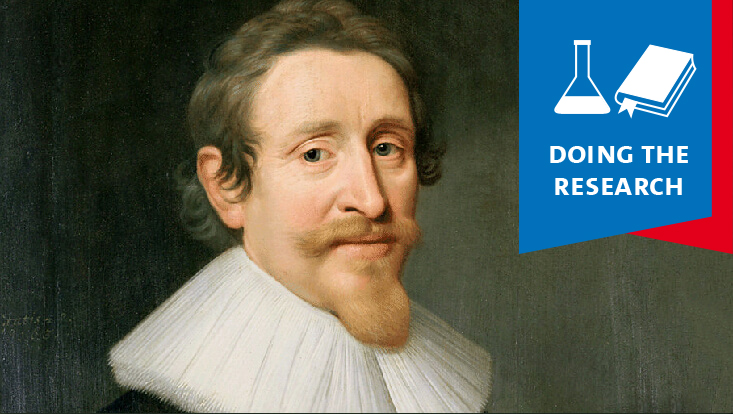Re-translation of a standard work from 1631When is war between countries justified?Doing the Research series
10 May 2022, by Anna Priebe

Photo: public domain
Authored in the seventeenth century but still relevant: a standard work of legal thought by Hugo Grotius, written in 1631, is being re-translated at Universität Hamburg’s Faculty of Law. Prof. Dr. Tilman Repgen, project head and dean of the faculty, on what makes this treatise on international law so special.
The research project focuses on De jur belli ac pacis libri tres (3 volumes on the rights of war and peace) published in the seventeenth century. What makes this work so special?
In the sixteenth century, religious unity in Europe ended and, as a result, many conflicts, including the Thirty Years’ War (1618–1648), escalated. Hugo Grotius’ work revolves around the question as to whether and under what conditions war is justified and how to wage just war. Grotius was not only the first to address the topic; he did so in an especially effective way. His magnum opus was an important link between Medieval tradition and the dawn of natural law that Grotius introduced and is based on human reason alone.
Grotius’ influence should not be misunderstood as having inspired all nations to heed his legal theories. In the scholarly discourse on the subject, however, his work quickly became seminal. Since the mid-seventeenth century, his work has essentially been a standard textbook for law students at all universities in the Protestant countries of Europe. It also drew commentary from many well-known legal scholars in the seventeenth and eighteenth centuries.

What distinguishes Grotius’ thought?
He developed an overall system of law. If you ask Grotius when war is justified, his answer would be: it depends on whether a case of self-help between countries is justified. This is the case if the rights of one are harmed by the other.
Grotius thus sees states as analogous to private citizens. If one citizen harms another citizen, then there is a legal relationship that can lead, for example, to a request for damages in court. In very narrowly defined conditions, there are paths towards self-help, for example, if judicial help cannot be secured in a timely manner. For the relationship between states, however, Grotius says: ubi iudicia deficiunt, incipit bellum—where judicial rule is absent, war begins.
So it is important for Grotius to think deeply about the question as to when the right of the state is actually harmed and what the substance of this right is. He essentially developed an entire system of law on this point, based on the rights of war and peace but treating many other legal matters, as well. And in many respects, Grotius is highly innovative. This is why his work has had such a resounding career in academia.
Where judicial rule is absent, war begins.
Why is a new translation so important?
There are translations in 12 languages, although the quality strongly varies. We would like to publish a new German version. One important reason is the murky textual foundation for the currently used translation by Walter Schätzel from 1950—which also contains a lot of distortions. The publisher writes in his foreword that he used the first edition from 1625, but shortly after the translation appeared it was revealed that Schätzel was mistaken and had used a later edition of the work. Grotius published a total of 5 revised and expanded editions and there is now consensus among researchers that the edition of 1631 is the best and most complete one. Therefore, we will use this as a basis for our translation, although we will also take other editions by Grotius into consideration in our annotations.
Furthermore, the publication from 1950 was in one language only, meaning it contains only the translation. Whoever reads this book has no way of checking whether the translation is accurate. This is not advantageous for scholarly work so we will publish a Latin-German edition.
Do we need this kind of work today when there are, for example, institutions such as the International Court of Justice in the Hague or the possibility for negotiations?
People could and did also negotiate earlier. The question about the court as an institution remains—and I have to say that today, we’re not much further than we were then. To that extent, Grotius’ basic questions are still relevant.
Of course, at the level of the European Union and the United Nations there are efforts to at least contain war. The causes of war are no longer as varied as they were in Grotius’ age. But the actual problem has not been solved: there is no global jurisdiction recognized by everyone and no world police who can enforce court decisions. We would like to have conflicts between nations and peoples resolved before the International Court of Justice but what we see in fact is that the world over exactly the opposite is happening.
Our book goes beyond current affairs and the goal is not to comment upon current political events but to conduct basic research. Naturally it will include a scholarly introduction so that the reader understands the context and sees what Grotius’ actually accomplished with his work.
Translation project De jure belli ac pacis libri tres
Hugo Grotius was born in Delft in 1583 and received his law degree at the age of 15 in Orléans. He worked in the diplomatic service and later as the chief prosecutor and counsel in Rotterdam. In 1618, he was imprisoned for religious reasons and given a life sentence. He managed to flee to Paris, where he published his magnum opus De jure belli ac pacis libri tres in 1625. A completely new translation based on the 1631 edition of the work is being developed as part of project within the Professorship for Civil Law, History of German Law, Private Law in Modernity. The project is being funded by the German Research Association.
Doing the Research
There are approximately 6,200 academics conducting research at 8 faculties at Universität Hamburg. Many students also often apply their newly acquired knowledge to research practice while still completing their studies. The Doing the Research series outlines the broad and diverse range of the research landscape, and provides a more detailed introduction of individual projects. Feel free to send any questions and suggestions to the Newsroom editorial office.

